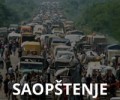The European Court transfers the responsibility for the non-prosecution of crimes from the Prosecution to the Victims
 One year after it rejected the application of former detainees from the Šljivovica and Mitrovo Polje camps, the European Court of Human Rights issued a decision on October 19 2017 declaring the second application, submitted on behalf of family members of the killed camp detainees, inadmissible. The Humanitarian Law Center (HLC), which represented the victims’ families in these proceedings, points out that the European Court re-used the same, factually unsustainable structure of reasoning in order to transfer the responsibility for the inactivity of war crimes prosecutions from the state to the victims themselves.
One year after it rejected the application of former detainees from the Šljivovica and Mitrovo Polje camps, the European Court of Human Rights issued a decision on October 19 2017 declaring the second application, submitted on behalf of family members of the killed camp detainees, inadmissible. The Humanitarian Law Center (HLC), which represented the victims’ families in these proceedings, points out that the European Court re-used the same, factually unsustainable structure of reasoning in order to transfer the responsibility for the inactivity of war crimes prosecutions from the state to the victims themselves.
On December 24 2014, the HLC filed two applications with the European Court of Human Rights against the Serbian state on behalf of the victims of the Šljivovica and Mitrovo Polje camps – one for the failure to investigate cases of torture of detainees (for which a court decision was brought in October 2016), and the second for the failure to investigate cases of the death of detainees, on which the court has decided today. Bearing in mind that those applications were filed on the same day, and that the argument for dismissal was ultimately identical, the European Court’s delay in decision-making in relation to the victims’ families seems inexplicable and irresponsible.
The two applications were the only possibility for the victims to realize their rights and those of their families after 2013, when the Serbian War Crimes Prosecution rejected the HLC’s criminal charge filed in 2011 against members of the Army of Yugoslavia (VJ), the Ministry of Internal Affairs (MUP) and State Security of the Republic of Serbia, for crimes committed in the period between August 1995 and April 1996. At that time, two detention camps for men and boys who had crossed the borders from Žepa into Serbia, and who were entitled to protection in accordance with international obligations towards refugees, were established in Serbia. The allegations of murders, daily beatings and torture of the detainees, as well as the inhumane conditions in which they were held, were rejected by the Serbian War Crimes Prosecution (OWCP), who failed to examine any of the 70 proposed witnesses.
As in its earlier decision, the European Court considered that this criminal complaint was submitted too late. This court concluded (paragraph 60 of the decision) that the OWCP in its practice views the war in Bosnia and Herzegovina (BiH) exclusively as an internal rather than an international armed conflict, i.e. that therefore Serbia did not participate in that war. By accepting such a basically political position from the Prosecution, the European Court further determined that the OWCP refused to investigate the crimes that took place in the territory of Serbia during the war in BiH, because it does not consider them as war crimes, and that for the applicants (former detainees and their families), it must have been known that their application would have no results.
Apart from the fact that an obligation is being imposed on these victims of serious crimes to possess legal knowledge to have to foresee how the competent body will qualify the actions they submit, the European Court, with a superficial analysis of the previous work of the OWCP, completely ignores its inactivity and thereby absolves it from its duty to prosecute crimes, for which it was established by the law.
Namely, the HLC reiterates the fact that the basic thesis on which the European Court has based this and its earlier decision is incorrect and that it has no foundation in the OWCP’s practice. It is enough to present again as an example the Indictment in the Tuzlanska kolona Case, in which the armed conflict in BiH was qualified as an international conflict; or to refer to the OWCP’s conduct in connection with the criminal charge of war crimes committed in the village of Kukurovići, which is also located in the territory of Serbia and was related to the armed conflict in BiH, and in relation to which the OWCP duly informs the HLC in regard to the investigations being undertaken.
From this and similar cases, the tendency of the court in Strasbourg is clear, namely, that by finding formal reasons such as the need for timely filing of criminal charges, even in the case of non-statutory crimes, an unreasonable burden is being placed on individuals whose fundamental rights have been grossly violated; and all this with the aim of non-involvement in cases that could have sensitive political implications. The HLC will consider, in this and other appropriate cases in the future, the addressing of the victims to the relevant UN committees, whose practice of considering serious human rights violations at this stage is much more favourable for the individual than for the states.








